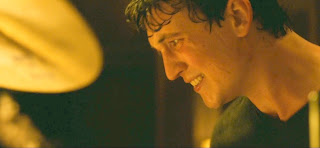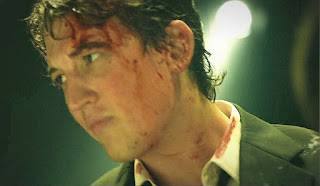Modern dating is a jungle of random hook-ups, Internet dating sites with questionable profiles, and other hurdles When Harry Met Sally never had to contend with.
First-time director Max Nichols (son of director Mike Nichols) chose wisely with his leads, Miles Teller and the lesser-known but bubbly Analeigh Tipton. She makes for an unconventional romantic lead which works because the same applies to Teller, an actor who has shown incredible range in more serious films in the past. Nichols and screenwriter Mark Hammer have an ear for millennial lingo, crucial considering the film is basically a two-hander set in one cramped apartment. Megan hits an online dating site for a quick hook-up, something she's never done before. She quickly meets Alec (Teller), who seems to be exactly what she's looking for; meaning he's cute, uncommitted, and not a serial killer. A quick scan via webcam confirms no bodies hanging on his apartment walls.
It's not until the film takes a more serious turn that Nichols and Hammer start dropping a few pearls. A frank conversation about men and women helping one another have better sex has some real insights. And once we see Megan and Alec put all of their emotional cards on the table it also opens up the performances by Teller and Tipton. Both strike a believable vulnerability as two people who have been bruised by love and are reluctant to give it another shot. Teller seems to be able to build chemistry with anybody, a rare talent that should take him far. Tipton has the much flakier role to play and she manages to be endearing rather than irritating. Ultimately, Two Night Stand is about the way such people use whatever is at their disposal to protect themselves from more hurt. Sometimes that's a convenient half-truth, or a dating profile that needs an update. Source: www.examiner.com
Miles Teller "Midnight Miles" video. Soundtrack: "Stuck on You," "I Got Stung," "Got a Lot O' Livin' To Do" & "Paralyzed" by Elvis Presley, "Moonlight Mile" by The Rolling Stones, and "You Never Know" by Wilco.
Nearly 40 million Americans utilize online dating sites. California Attorney General Kamala D. Harris partnered with three major dating sites — EHarmony, Match.com, and Spark Networks — to create company guidelines that would make online dating safe for its users. There is a misconception that these relationships are doomed to fail, but the survey showed that couples who met online were less likely to divorce than those who met through traditional methods. Only 5.96 percent of relationships that began online ended in divorce or separation. Of those who remained married, they reported higher levels of satisfaction than those who met offline. Source: www.inquisitr.com
Michael Rosenfeld: -One of the things I have found out as part of my research is that people who meet online actually progress to marriage faster than people who meet offline. If you look at the couples who stay together, about half of the couples who meet through online dating have transitioned to marriage by year four of the relationship. The need for love, romance, relationships and sex — these are pretty basic human needs. And the ability to match people who would have otherwise not found each other is a powerful outcome of the new technology. About 75 percent of the people who meet online had no prior connection. They didn’t have friends in common. They’re families didn’t know each other. So they were perfect strangers. And prior to the Internet, it was kind of hard for perfect strangers to meet.
Source: www.washingtonpost.com
Source: www.washingtonpost.com






































































